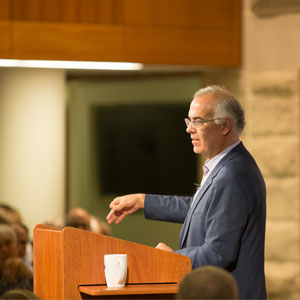The Necessity of Moral Discourse in Public Life
December 20, 2016 | Alumni, Campus Life, Library, President, Public, Religion & Society

– When David Brooks speaks, people listen. The best-selling author and political commentator appeared in the Princeton Seminary library before a standing-room-only audience of over 400 students, faculty, and visitors to speak about community life and the social fabric that binds us together. Brooks’ lecture on November 22 came at a timely moment, as the nation was still reeling from a divisive presidential election.
Brooks, who is an op-ed columnist for The New York Times, as well as a commentator for The PBS NewsHour, NPR’s All Things Considered, and NBC’s Meet the Press, is an experienced political analyst. Yet rather than dwell on political controversies, Brooks explored cultural, philosophical, and theological questions. As Seminary President M. Craig Barnes noted, Brooks is “an astute commentator on public and political life” who “has a unique ability to help us view the world through theological lenses and attend to the moral dimensions of public life.”

Barnes invited Brooks to speak to the Seminary community in the conviction that theology brings much to bear on the issues facing our civic life. At Princeton Seminary, he said, “we talk a great deal about what it means to be a community that shares life together, a community that is grounded in a covenant. And David Brooks reminds us that this has implications not just for what we do here, but for our nation and our world.”
Three words that Brooks used frequently in his talk—“solidarity,” “intimacy,” and “connection”—got to the heart of his understanding of American culture at this point in the nation’s history. “In traveling all around the country,” he said, “I came to the conclusion that all the problems we see—polarization, inequality, rampant mistrust, our inability to compromise in politics—have an underlying problem, which is a crisis of solidarity, a crisis of intimacy, a crisis of connection.”

“I came to the conclusion that all the problems we see—polarization, inequality, rampant mistrust, our inability to compromise in politics—have an underlying problem, which is a crisis of solidarity, a crisis of intimacy, a crisis of connection.”
“That’s measurable in various ways,” he added. “The decline in trust among neighbors. The general sense of loneliness and detachment.” He noted that “the fastest-growing category among religions is ‘unaffiliated,’ and the fastest-growing category among political parties is also ‘unaffiliated.’”
Brooks believes that antidotes to the pervasive isolation and alienation he witnessed on his travels in America over the last two years are not economic and sociological; instead, they are psychological and theological. “We have to be more communal in an age that that is too individualistic. We have to be more emotional in a culture that is too cerebral.”

“We have to be more communal in an age that that is too individualistic. We have to be more emotional in a culture that is too cerebral.”
Brooks spoke eloquently about the power of intimacy, connection, and covenant in our common life. He insists that “the fulfillment of our lives depends on how we choose and execute commitments.” He is working on a a new book in order to explore what he called “the five covenantal relations” that arise in most people’s lives—covenants founded on (1) marriage and family; (2) vocation; (3) friendship; (4) philosophy and faith; and (5) community and nation.
As for his own vocation, Brooks seeks to provide a corrective to public discourse that has become “over-politicized and under-moralized.” He added: “We talk too much about the ‘jibs and jabs’ of polls. But we don’t talk enough about how to make use of suffering, how to find meaning in life, what grace means, what redemption means, and we don’t even have the moral vocabulary of what the word sin means.”
In this respect, he spoke of the shared work of commentators like himself who have an eye toward the public good with pastors and theologians. Brooks told the audience, “My own personal calling—but I think it’s the calling of a lot of people here tonight—is to shift the culture over to moral discourse again.”





